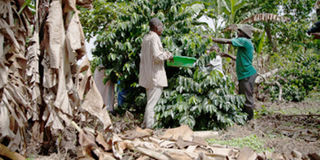Coffee farmers to be trained in finance skills

In addition to good farming practices , farmers getting business skills helps increase coffee production. file photo
Uganda Coffee Farmers’ Alliance (UCFA), in partnership with Centenary Bank, has launched skills training for farmers who grow coffee in the country to empower them with savings and credit management so they can improve their livelihoods.
It is expected that the knowledge will help them to effectively use financial resources, increase their yields and subsequently household revenues.
Mr Tony Mugoya, UCFA’s executive manager, said the target is 53,000 coffee growing households in the country. So, the Alliance is working in partnership with 82 smallholder farmer groups and 1,640 producer organizations in the country.
“UCFA and Centenary Bank are providing knowledge to farmers so that the amount of coffee produced per household increases,” he said.
Mr Evans Nakhokho, Centenary Bank’s Chief Manager for Agricultural Credit, revealed that 18 percent of the bank’s lending portfolio was to agriculture compared to the industry average of 6.5 per cent. Currently, it is serving close to 26,000 farmers and agribusinesses.
More growth
During the session in Masaka town, about 30 coffee farmers from Kitanda and Bigasa sub-counties in Bukomansimbi and Kyanamukaka, Buwunga, Mukungwe sub-counties in Masaka were instructed on how to manage finances, to plan for a business, to maintain product quality.
The trainings will also involve coffee farmers in Mubende, Mityana, Luweero and Kasese districts.
Mugoya said access to these trainings by farmers has provided impressive growth as UCFA’s associations have evolved into marketing companies, which has led to more farmers being recruited and the realisation of more tangible benefits of group marketing.
A renewable energy project, which will use sweet sorghum as raw material, has been initiated in Kayunga District. It will target 10,000 households and create 500 jobs in the process.
The project is implemented by Bio-Green investments East Africa, and according to Mr Tom Matte W’abukombi, the chief executive officer, they are in the process of training farmers on how to manage the crop. “After being trained in modern sorghum growing practices, farmers would be given seeds,” he added.
Also, the company would open up 500 hectares for a nucleus farm and establish an outgrower scheme to cover 4,657 hectares by end of 2014. It is expected that 20 million litres of ethanol will be produced per year and 6-8MW of electricity. Other products will include briquettes, fertilisers, and poultry and animal feeds.
The briquettes would reduce demand for firewood and charcoal, consequently leading environmental protection. “The briquette making machine wil have a capacity of 850million tones per month by the end of 2013,” W’abukombi said.
Mr Steven Dagada, Kayunga district chairman, noted that introduction of the new crop would provide an alternative after coffee, the main cash crop, was attacked by the wilt disease, reducing its production by almost a half.




